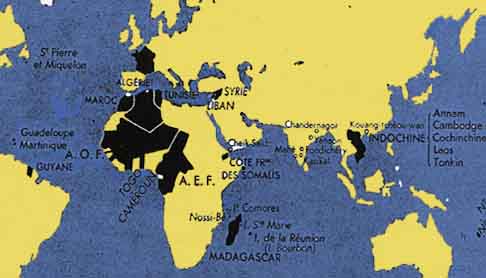Day 14 -- Colonialization
Alice L. Conklin, A Mission to Civilize: The Republican Idea of Empire in France and West Africa, 1895-1930 (Stanford: Stanford University Press, 1997, pp. 4-10.
While the material control of nature through science
and technology was certainly central to French definitions of civilization,
it always shared pride of place with a belief that republican France had
achieved unparalleled supremacy in the moral, cultural, and social spheres
as well . . .
definitions of civilization,
it always shared pride of place with a belief that republican France had
achieved unparalleled supremacy in the moral, cultural, and social spheres
as well . . .
What, then, were France's official civilizing ideas
in West Africa between 1895 and 1930? French imperial ideology consistently
identified civilization with one principle more than any other: mastery.
Mastery not of other peoples-although ironically this would become one of
civilization’s prerogatives in the age of democracy; rather mastery over
nature, including the human body, and mastery of what came to be called
“social behavior.” To put it another way, to be civilized was to be free
from specific forms of tyranny: the tyranny of the elements over man, of
disease over health, of instinct over reason, of ignorance over knowledge
and of despotism over liberty. Mastery in all these realms was integral to
France’s self-definition under the Third Republic.
. It was because the French believed that they had triumph d over
geography, climate, and disease to create new internal and external markets,
and because they before all other nations had overcome oppression and
superstition to form a democratic and rational government, that republican
France deemed itself so civilized. By the same token, it was because the
inhabitants of the non-European world were perceived to have failed on these
same fronts -- because they appeared to lack the crucial ability to master
-- that they were just as obviously
barbarians, in need of civilizing.
A conflation of civilization with mastery was thus a
defining and permanent characteristic of French rhetoric . . . Before 1914,
two tenets dominated French civilization doctrine . . . First, confronted
with the economic poverty of the indigenous populations, the French believed
that civilization required that they improve their subjects’ standard of
living through the rational development . . . of the colonies’ natural and
human resources. This objective,
they thought could best be achieve by building railroads -- because
railroads would link the interior to the coast and promote the exchange of
peoples, currencies, commodities, and ideas -- and by improving hygiene to
eliminate the parasites deadly to Europeans and Africans. Second, the French
insisted that civilization required that the different West African peoples
had to evolve within their own cultures, to the extent that these cultures
did not conflict with the republican principles of French civilization. When
a conflict arose, the offending African mores were to be suppressed and
replaced by French ones. After a prolonged struggle with African leaders in
the Western Sudan four African institutions were singled out for
eradication: indigenous languages, slavery, barbaric customary law, and
"feudal" chieftaincies. The republican virtues of a common language,
freedom, social equality, and liberal justice were to take their place. . .
.
There can, of course, be little doubt that colonization under the
Third Republic was in large part an act of state-sanctioned violence.
On the crudest level, the French “pacified” those West African groups
who resisted colonialization. On
a more subtle level, French rule rested upon a set of coercive practices
that violated their own democratic values.
Africans were designated as subjects, not citizens.
They had duties, but few rights.
In neither case, however, did French republicans identify any
contradiction between their democratic institutions and the acquisition and
administration of their empire.
This was because they viewed Africans as barbarians, and were continually
undertaking – or claiming to undertake, as the case may be – civilizing
measures on behalf of their subjects that appeared to make democracy and
colonialism compatible.